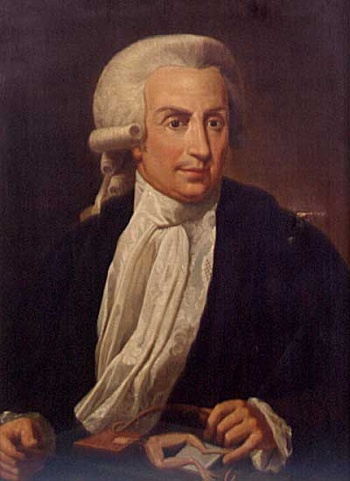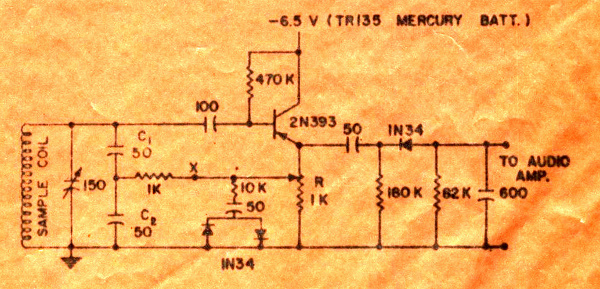Electricity, Magnetism and Morality
September 28, 2011
Many
scientific discoveries have been proposed as palliatives or cures for various diseases. As soon as
electricity was discovered, it was being used for medicinal purposes.
Benjamin Franklin tried electricity as a cure for
paralysis.[1] Franklin's attempt had somewhat of a scientific basis in light of the work of
Luigi Galvani, who used electricity to animate dead
frog legs.

Portrait of Luigi Galvani (1737-1798) by an unknown artist at the Museo di Palazzo Poggi, Bologna, Italy
Galvani's discovery was a side-effect of his misguided search for frog testicles. He thought that they were located in the legs. He published his electrical results in his 1791 paper, De viribus electricitatis in motu musculari commentarius (Commentary on the Force of Electricity on Muscular Motion).
(Via Wikimedia Commons))
John Wesley (1704-1791), an
English clergyman, used electricity as a medical treatment among the poor, and he published his research in the 1760 book, "Desideratum, or Electricity made Plain and Useful by a Lover of Mankind and of Common Sense." This work lists thirty-seven ailments that he found to be treatable by electricity, including
"
St. Anthony's Fire...
Consumption...
Fits,
Ganglions,
Gout,
Gravel...
King's Evil,
Leprosy...
Shingles...
Surfeit... (and)
Toothache."[2]
Wesley had a few unkind words to say about
physicians and
pharmacists. He claimed that they would reject electrical treatment, since they were making too much money by their current medical practices, so they would eschew such a cheap therapy.[2]
Where there's electricity, there's
magnetism, as shown by
James Clerk Maxwell in 1864, but the supposed medical benefits of magnetism predate even Maxwell's discovery. Magnetism was prescribed medically in
ancient Greece, and during the
Middle Ages.[3] Medical magnetic appliances such as magnetic insoles for foot pain and magnetic bracelets for
arthritis are presently a $300 million/year business.[3]
There are, of course, legitimate uses of magnetism in medicine. Foremost among these is
magnetic resonance imaging (MRI), which provides the best possible contrast for imaging
soft body tissues. This results from its sensing the local concentration of
hydrogen via the presence of its
1H
nucleus.
MRI has the benefit that no
ionizing radiation is involved, as for
X-ray and
CAT scans. There are, however, high magnetic fields involved; but, MRI has been practiced since the early 1980s with
no apparent ill effects.
How is magnetism used in MRI? Nuclei with an odd numbers of
spins, of which
1H is the simplest example, will
precess in an applied magnetic field in analogy to a
gyroscope in a
gravitational field. This is because the nucleus resembles a spinning
charge, which is like an
electric current, so a magnetic field is produced. A
radio frequency field can be tuned to
resonance with this precession, and the
lifetime of this resonant state can be measured to produce image contrast.[4]
The resonant frequency for hydrogen is a function of the magnetic field, and it's given by the
Larmor equation. It's essentially 42.57
MHz/
Tesla, a Tesla being 10,000
Gauss. If you have a uniform magnetic field source from a magnet with a large pole piece, it's possible to demonstrate proton magnetic resonance with very simple circuitry (see figure).[5]

A simple transistor marginal oscillator for proton magnetic resonance. I built a modified version of this circuit as an undergraduate project in 1969. A dilute copper sulfate solution in a test tube is inserted into the coil. The copper salt speeds relaxation of the proton resonance and enhances signal strength. The resonance is calculated to be about 12.77 MHz at 3 kG. (Fig. 1 from Ref. 5, via an aged thermofax copy).
Development of technologies such as MRI has produced equipment that allows immersion of human subjects into magnetic fields of many Tesla. Advances in instrumentation have always enabled new scientific discoveries. The invention of the
telescope showed the
universe to be a different place than first imagined, and magnetic equipment developed for magnetic resonance imaging has shown the possibility of
mind control in humans.[6-11]
A 2010 paper in the
Proceedings of the National Academy of Sciences by scientists from ,
Harvard University,
MIT and the http://en.wikipedia.org/wiki/Beth_Israel_Deaconess_Medical_Center
Beth Israel Deaconess Medical Center reports that magnetic stimulation of the right
temporo-parietal junction of the
brain affects moral judgment. The presumed mechanism is that the magnetic field impedes the
normal firing of brain cells.[6-8]
The effect is only present when the magnetic field is applied - it isn't permanent. Experiments showed that the magnetic stimulation caused subjects to view morally ambiguous situations in a more favorable light. Study participants who were subjected to the focused magnetic field judged "attempted harms as less morally forbidden and more morally permissible."[6]
Liane Young of MIT, a coauthor of the study, is quoted by the
BBC as saying that "to be able to apply a magnetic field to a specific brain region and change people's moral judgments is really astonishing."[7]
A similar study, recently published in the journal,
Behavioural Brain Research, by scientists from the
University of Tartu (Tartu, Estonia) and the
Estonian Academy of Security Sciences (Tallinn, Estonia), appears to show that magnetic stimulation of the leftmost part of the
dorsolateral prefrontal cortex (DPC) part of the brain caused test subjects to lie more often; and magnetic stimulation of the rightmost part of the DPC caused test subjects to tell the truth more often.[9-11]
References:
- Wendy Moore, "Shocking treatment," BMJ (British Medical Journal), vol. 342 (June 8, 2011), doi: 10.1136/bmj.d3566.
- H. Newton Malony, "John Wesley and the Eighteenth Century Therapeutic Uses of Electricity," Perspectives on Science and Christian Faith, vol 45 (December, 1995), pp. 244ff.
- John Newcomer, "Magnetic Therapy: Cure or Hoax?" Consumer Warning Network, September 16, 2008.
- James Voyvodic, "Basic Physical Principles of MRI," Duke University Web Site.
- Bailey Donnally and T. M. Sanders, "Simple Transistor Marginal Oscillator for Magnetic Resonance," Rev. Sci. Instrum., vol. 31, no. 7 (September 9, 1960), pp. 977-8.
- Liane Young, Joan Albert Camprodon, Marc Hauser, Alvaro Pascual-Leone and Rebecca Saxe, "Disruption of the right temporoparietal junction with transcranial magnetic stimulation reduces the role of beliefs in moral judgments," Proc. Natl. Acad. Sci., vol. 107 no. 15 (April 13, 2010), pp. 6753-6758.
- Morality is modified in the lab, BBC News, March 30, 2010.
- Eric Bland, "Magnets Can Manipulate Morality," Discovery, March 29, 2010
- Inga Karton and Talis Bachmann, "Effect of prefrontal transcranial magnetic stimulation on spontaneous truth-telling," Behavioural Brain Research, vol. 225, no. 1 (November 20, 2011), pp. 209-214.
- Ted Thornhill and David Derbyshire, "Zapping the brain with magnets makes it IMPOSSIBLE to lie, claim scientists," Daily Mail (UK), September 8, 2011
- Anissa Haddadi, "Magnetic Pulses to the Brain Make it Impossible to Lie: Study," ibtimes, September 9, 2011.
Permanent Link to this article
Linked Keywords: Scientific; electricity; Benjamin Franklin; paralysis; Luigi Galvani; frog; Museo di Palazzo Poggi, Bologna, Italy; Wikimedia Commons; John Wesley; English; St. Anthony's Fire; Consumption; Fits; Ganglions; Gout; Gravel; King's Evil; Leprosy; Shingles; Surfeit; Toothache; physician; pharmacist; magnetism; James Clerk Maxwell; ancient Greece; Middle Ages; arthritis; magnetic resonance imaging; soft body tissues; hydrogen; nucleus; ionizing radiation; X-ray; CAT; spin; precess; gyroscope; gravitational field; charge; electric current; radio frequency field; resonance; lifetime; Larmor equation; MHz; Tesla; Gauss; marginal oscillator; copper sulfate; thermofax; telescope; universe; mind control; Proceedings of the National Academy of Sciences; Harvard University; Massachusetts Institute of Technologyp; MIT; Beth Israel Deaconess Medical Center; temporo-parietal junction; brain; normal firing; Liane Young; BBC; Behavioural Brain Research; University of Tartu (Tartu, Estonia); Estonian Academy of Security Sciences (Tallinn, Estonia); dorsolateral prefrontal cortex.